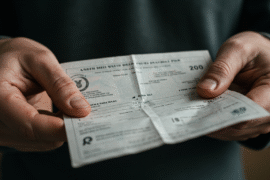This article may contain references to products or services from one or more of our advertisers or partners. We may receive compensation when you click on links to those products or services. Nonetheless, our opinions are our own.
The information presented in this article is accurate to the best of our knowledge at the time of publication. However, information is subject to change, and no guarantees are made about the continued accuracy or completeness of this content after its publication date.
Think about a world where kids who want to learn about money can do so, not just adults. This article is about a 30-year-old accountant who is doing something amazing: teaching kids as young as seven how to handle their money. She loves numbers and wants to shape the future, so she turns complicated financial ideas into fun lessons that are just right for her young students. You’ll learn about the creative ways she makes budgeting, saving, and investing not only possible but also enjoyable. As we learn about her journey and inspiring mission, you’ll think about how teaching kids about money at such a young age can change their lives. Her commitment to raising a generation of financially smart kids who are ready to take on the world will inspire you.
- Discovering the Importance of Financial Literacy at a Young Age
- Basics of Money Management for Kids
- Engaging Activities to Teach Children About Saving and Spending
- Building a Strong Foundation for Future Financial Success
- Practical Tips for Parents to Reinforce Money Lessons at Home
- Encouraging Values of Generosity and Sharing in Financial Education
- Involving Schools and Community Resources in Financial Education
- Conclusion
- Frequently Asked Questions
- What inspired the initiative to teach children about money?
- What age group is primarily targeted, and why?
- What topics are covered in the lessons?
- How is learning about money made fun for young children?
- What challenges arise when teaching children about money?
- What impact has been observed from the program?
- What advice is offered to parents who want to teach kids about financial planning?
- What are the future plans for this initiative?
- Recommended Reads
Discovering the Importance of Financial Literacy at a Young Age
As you start your financial journey, think about how important it is to learn how to handle money from a young age. Kids can understand basic ideas about money that can affect how they think about it in the future when they are only seven years old. These kids are learning more than just how to count cents; thanks to a dedicated 30-year-old accountant, they are also gaining important life skills. Being financially literate means more than just knowing how to make a deal; it means being able to make smart choices for the rest of your life. Here are some of the critical areas being covered:
- Budgeting Basics: Kids, including tweens, are introduced to the idea of budgeting, learning how to allocate their allowance wisely.
- Saving and Spending: The importance of saving a portion of their money for future needs versus wants is emphasized.
- Value of Money: By understanding how to earn and manage money, they begin to appreciate its role in their daily lives.
| Activity | Outcome |
|---|---|
| Buying a Toy (Immediate Spend) | Short-term enjoyment, but depletion of savings |
| Saving for a Bike (Long-term Save) | Greater satisfaction and the achievement of a goal |
This early instruction is very important because it sets the stage for a lifetime of good money habits. When kids know how important their choices are, they can make a safe and successful future for themselves. The combination of fun teaching methods and strong financial principles gives them the tools they need to be financially independent and strong as adults.
Basics of Money Management for Kids
It might seem hard to teach kids about money management from a young age, but if you do it the right way, it can be a fun and educational experience. You can teach kids the basics of money by breaking down hard ideas into lessons that make sense to them. Start by talking about how important it is to save money. Then, help them set small savings goals and give them rewards when they reach them. This basic habit will help you feel like you’ve accomplished something and give you a long-term understanding of money.
Also, it can be helpful to teach kids how to use different money management tools through hands-on activities. Play budget-tracking games or role-playing games with them where they buy and sell things with fake money. You can make the idea of money more real by using pictures to show how to spend, save, and share money, especially when you’re planning for a big purchase.
Here’s a simple table that outlines some engaging activities you can use:
| Activity | Description |
|---|---|
| Saving Challenge | Set a goal for saving a specific amount over a month. |
| Mock Store | Create a shop at home where kids can “buy” and “sell” items. |
| Finance Storybooks | Read and discuss children’s books centered around money themes. |
You’re giving them a great start in life by making learning about money fun. Always keep in mind that the skills and attitudes they learn now will stay with them into adulthood and affect how they handle money for years to come.
Engaging Activities to Teach Children About Saving and Spending
Teaching children about money can be a fun and rewarding experience. Activities that engage a child’s imagination and creativity can turn abstract concepts like saving and spending into tangible lessons and help them develop good money habits. Here are some engaging ideas to introduce financial literacy to your little ones:
- Money Jars: Create separate jars for saving, spending, and sharing. Encourage your child to allocate their allowance or gifts into these jars, helping them understand the importance of each category.
- Grocery Store Role Play: Set up a mini grocery store at home where your child can use play money to buy items. This activity teaches them about pricing, budgeting, and making choices based on their available funds.
- DIY Piggy Bank Craft: Get creative by crafting a piggy bank from a simple container. Personalizing their bank reinforces the value of saving for something special.
You could also plan a fun game night with board games that teach kids how to manage money, like Monopoly or Life. These kinds of games teach kids about investing, owning property, and the value of money while also encouraging friendly competition.
| Activity | Skills Developed |
|---|---|
| Money Jars | Budgeting, Goal Setting |
| Role Play Grocery Store | Decision Making, Value Recognition |
| Board Games Night | Strategic Thinking, Planning |
Building a Strong Foundation for Future Financial Success
As you embark on your journey toward financial literacy, it’s essential to understand the principles of managing money from a young age. By engaging with resources tailored specifically for children, like interactive apps, games, or engaging stories, you can help instill a sense of duty and curiosity about finances in them. Here are a few foundational concepts that can set the stage for lifelong financial health:
- Savings: Teach the importance of saving money and set goals for what they want to save for, inspiring them to reach milestones. Discuss borrowing in the context of reaching these savings goals responsibly.
- Budgeting: Introduce the basics of budgeting; show how money is earned and spent, helping them understand the value of each dollar.
- Needs vs. Wants: Explain the difference between necessities and desires, encouraging critical thinking about their financial choices.
| Category | Amount |
|---|---|
| Allowance | $10 |
| Savings for a toy | $5 |
| Spent on candy | $3 |
| Leftover | $2 |
By telling young people about your own financial struggles and successes, you encourage them to take control of their money early on. These basic skills give them the power to handle problems in their personal lives and get ready for financial problems in the future, making sure they have everything they need for a successful future.
Voted "Best Overall Budgeting App" by Forbes and WSJ
Monarch Money helps you budget, track spending, set goals, and plan your financial future—all in one app.
Get 50% OFF your first year with code MONARCHVIP
Practical Tips for Parents to Reinforce Money Lessons at Home
Encouraging money smarts in your children can start right at home, and it’s a great way to make financial lessons engaging and practical. Consider incorporating these ideas into your daily routine:
- Involve Them in Budgeting: Sit down as a family to discuss your monthly budget. Show them how you allocate funds for necessities, savings, and fun activities. This not only demystifies budgeting but also makes them feel included in family decision-making.
- Create a Savings Challenge: Turn saving into a game. Set a target amount and a timeline, and encourage your child to save a portion of their allowance or any future paycheck. Add a small incentive for reaching the goal, such as a family outing or a treat.
- Use Real-Life Scenarios: When making purchases, explain the decision-making process. Ask them questions like, “Is this item worth the price? What will happen if we wait for a sale?” This helps them understand the value of money.
| Activity | Purpose |
|---|---|
| Weekly Family Shopping Trip | Understanding pricing and value |
| Monthly Savings Goals | Setting and achieving financial goals |
| Allowance Tracking | Managing personal finances |
By doing these things with your kids, you’ll not only teach them important money skills, but you’ll also bond with them through shared learning experiences. Keep in mind that consistency is key. The more you make these lessons a part of your daily life, the more naturally they will learn how to value money.
Encouraging Values of Generosity and Sharing in Financial Education
As you start your journey to teach kids the basics of money management, it’s important to stress the importance of sharing and being generous. These principles not only help people feel like they are part of a community, but they also help people think of money as a way to make things better. Incorporate activities that show how sharing resources can benefit everyone to help the next generation of kids think beyond their own interests. For example, you could have them work together on a small class project to raise money for a charity by pooling their allowances. This hands-on experience teaches them how to budget and gives them a sense of giving.
- Giving Back: Discuss how sharing a portion of their savings or allowance can make a difference in someone else’s life.
- Cooperative Efforts: Engage them in collaboration on a financial goal, such as buying supplies for a local animal shelter, reinforcing the idea that teamwork amplifies impact.
- Celebrating Achievements: Encourage recognition of each other’s contributions to foster an atmosphere of appreciation and community spirit.
| Activity | Value Learned |
|---|---|
| Collective Fund for Charity | Importance of Sharing |
| Group Purchasing for Supplies | Value of Cooperation |
| Celebrating Contributions | Cultivating Gratitude |
By including these lessons in everyday talks about money, you’re not just teaching kids how to save; you’re also raising responsible citizens who know how their financial choices affect the world around them. These values will give them the strength to take care of their money in the future with a sense of responsibility, compassion, and understanding of the people around them.
Involving Schools and Community Resources in Financial Education
Schools and groups in the community are very important for teaching people about money. Communities can help kids learn more about how to handle money by including financial literacy in the curriculum and supporting local events and programs. Young learners can take part in hands-on activities, workshops, and group learning experiences through partnerships with schools, libraries, and community centers. These activities build on what kids learn at home and make sure they have a strong base of financial knowledge that will last into adulthood.
Conclusion
One of the best things a child can learn is how to handle money, and the earlier they start, the better. We give kids tools that will help them for the rest of their lives by teaching them how to save, budget, spend wisely, and be generous. Parents, schools, and communities all have a big part to play in how these lessons are learned. Children can learn how to be responsible with money and feel good about their ability to handle it if they are taught in creative ways, do hands-on activities, and get regular reinforcement. Taking small, planned steps toward financial independence is the first step. The work you do today will make the future brighter and more stable for the next generation.
Frequently Asked Questions
What inspired the initiative to teach children about money?
The program came about because the people who made it really believed that knowing how to handle money was important. A lot of adults have trouble managing their money, but teaching kids about money early on helps them make better choices as they get older.
What age group is primarily targeted, and why?
The lessons are for kids who are seven years old, which is when they are curious, eager to learn, and able to understand the basics of saving and spending. At this point, teaching kids about money helps them develop good money habits early on.
What topics are covered in the lessons?
The curriculum includes learning how to save, make a budget, earn money, and tell the difference between needs and wants. Kids also do hands-on things like making budgets for small projects or using fake money to practice real-life transactions.
How is learning about money made fun for young children?
Games, stories, and role-playing are all ways to get people involved. For instance, kids buy and sell things, use visual aids like savings jars, and do hands-on activities that make abstract ideas about money real.
What challenges arise when teaching children about money?
A major problem is dealing with the ideas that kids might already have from home or the media. Lessons focus on gently changing these ideas by teaching people how to manage their money in a positive and useful way.
What impact has been observed from the program?
Kids often get excited about saving their allowances and making money decisions at home. Parents often say that their kids start asking smart questions about money, which shows that the lessons are working.
What advice is offered to parents who want to teach kids about financial planning?
Parents should start talking about money with their kids early and often. Everyday things, like going grocery shopping or planning family outings, can be great chances to teach. Setting a good example for your kids when it comes to money at home also has a lasting effect.
What are the future plans for this initiative?
The program wants to reach more people through online tools and workshops for parents. We are making age-appropriate materials for schools and homes with the goal of making sure that every child grows up with a good understanding of money.

Reviewed and edited by Albert Fang.
See a typo or want to suggest an edit/revision to the content? Use the contact us form to provide feedback.
At FangWallet, we value editorial integrity and open collaboration in curating quality content for readers to enjoy. Much appreciated for the assist.
Did you like our article and find it insightful? We encourage sharing the article link with family and friends to benefit as well - better yet, sharing on social media. Thank you for the support! 🍉
Article Title: Teaching Kids Money Skills Early
https://fangwallet.com/2025/09/20/teaching-kids-money-skills-early/The FangWallet Promise
FangWallet is an editorially independent resource - founded on breaking down challenging financial concepts for anyone to understand since 2014. While we adhere to editorial integrity, note that this post may contain references to products from our partners.
The FangWallet promise is always to have your best interest in mind and be transparent and honest about the financial picture.
Become an Insider

Subscribe to get a free daily budget planner printable to help get your money on track!
Make passive money the right way. No spam.
Editorial Disclaimer: The editorial content on this page is not provided by any of the companies mentioned. The opinions expressed here are the author's alone.
The content of this website is for informational purposes only and does not represent investment advice, or an offer or solicitation to buy or sell any security, investment, or product. Investors are encouraged to do their own due diligence, and, if necessary, consult professional advising before making any investment decisions. Investing involves a high degree of risk, and financial losses may occur including the potential loss of principal.
Source Citation References:
+ Inspo
There are no additional citations or references to note for this article at this time.










































